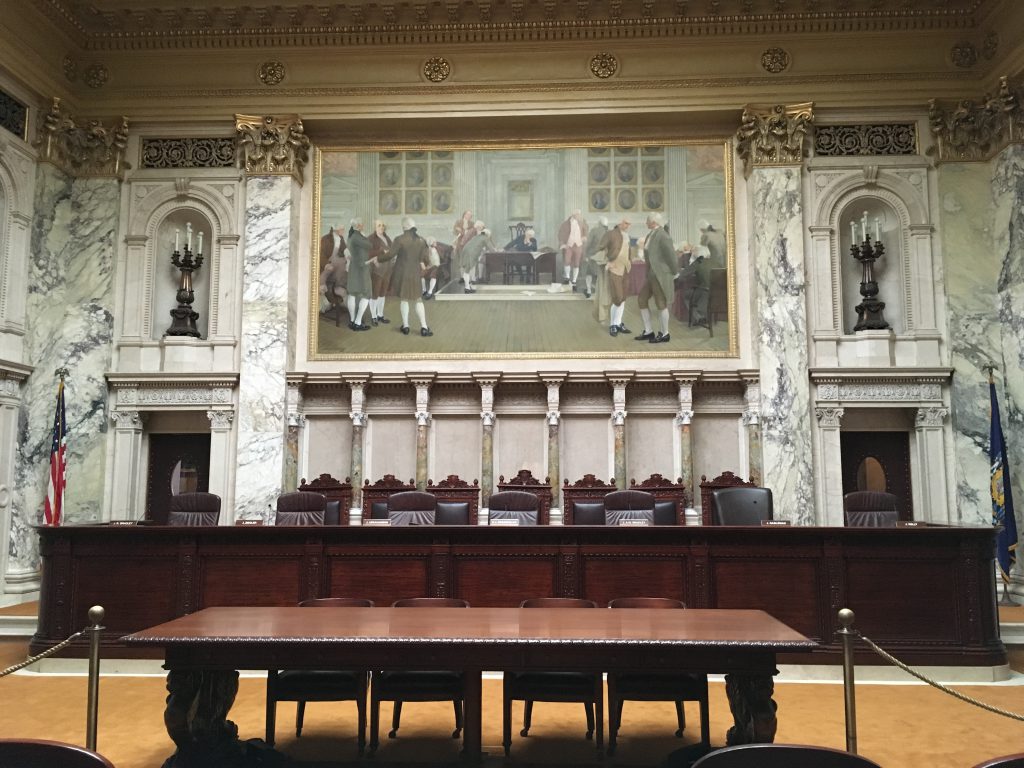Why Is State Supreme Court So Angry?
Justices’ strange interpretation of watershed 1803 decision becomes a right-wing battering ram.
There are certain themes that commonly appear in the decisions, and dissents, of three members of the Wisconsin Supreme Court. To illustrate, I will look at three cases:
- The first of the three cases is Stempski v. Heinrich, a challenge to a masking order covering Madison and Dane County. In an unsigned order last week, the Supreme Court rejected a request to bring this complaint directly to the Court, skipping lower courts. While the order itself was unsigned it included 10 pages of dissents from the three justices—Chief Justice Patience Roggensack and Justices Annette Ziegler and Rebecca Bradley.
- The second case is Trump v. Biden, one of the numerous cases brought by then-president Donald Trump and his allies to reverse the vote in the 2020 presidential election. On a 4 to 3 vote the Wisconsin Supreme Court rejected this challenge to the election. The same three justices dissented from the court’s decision.
- The last of the cases is Kristi Koschkee v. Tony Evers (later, Tony Evers was replaced by Carolyn Stanford Taylor when he was elected governor and left the Department of Public Instruction). By a 4 to 2 vote, the Supreme Court upheld a requirement that DPI proposed rules must be approved by the governor (at the time, Scott Walker).
Time and again the three justices latch on to a sentence from Justice John Marshall’s decision (in 1803) in Marbury v. Madison: “It is emphatically the duty of the Judicial Department to say what the law is.” After over two hundred years, these words seem noncontroversial. After all, Marbury v. Madison is considered foundational to the American legal system. Why the obsession with them?
There seem to be two explanations. One is that the three judges resent what they see as state regulatory agencies as trespassing on territory that rightfully belongs to them. Here is Rebecca Bradley concurring in the Koschkee case:
… we ended our practice of deferring to administrative agencies’ conclusions of law,” thereby reclaiming the judiciary’s constitutionally-vested authority to say what the law is. … Rather than placidly accepting the administrative state as a necessary appendage to the government, this court should reconsider its acquiescence to subdelegations of legislative power to administrative agencies within the executive branch when the appropriate case presents the opportunity.
Or consider Roggensack’s take in Trump v. Biden on advice from the Wisconsin Elections Commission:
The Milwaukee County Board of Canvassers and the Dane County Board of Canvassers based their decisions on erroneous advice when they concluded that changes clerks made to defective witness addresses were permissible. And, the Dane County Board of Canvassers erred again when it approved the 200 locations for ballot collection that comprised Democracy in the Park.
This attitude, if adopted by a majority of the Supreme Court, would create an impossible quandary for state officials who are charged with managing elections, as an example. Whatever decisions they make are subject to the court’s second guessing when challenged by a losing candidate. The three justices seem quite comfortable with throwing out votes if they disagree with elements of the election’s design.
The second reason seems to be irritation that their colleagues are failing in their duty to say what the law is. Here is Rebecca Bradley in Trump v. Biden:
I dissent because, once again, this court abdicates its responsibility to “say what the law is.” … It is our solemn judicial duty to say what the law is. The majority’s failure to discharge its duty perpetuates violations of the law by those entrusted to administer it.
In her own dissent, Ziegler picks up the same theme:
We are called upon to declare what the law is. “It is emphatically the province and duty of the judicial department to say what the law is.”
Under this view, one of the primary purposes is to develop the law. Thus throwing out a case because a party lacks standing or because it is brought too late, disappoints because it avoids an opportunity to “say what the law is.”
Chief Justice Marshall, in Marbury v. Madison makes it clear that saying “what the law is” is not an end in itself. Instead, it is a tool to help resolve the case or controversy:
It is emphatically the province and duty of the judicial department to say what the law is. Those who apply the rule to particular cases, must of necessity expound and interpret that rule. If two laws conflict with each other, the courts must decide on the operation of each.
In recent years, opposition to the so-called “regulatory state” has become a cause particularly among some right-wing law professors. One of their prime complaints is that regulators are not elected. Rebecca Bradley (dissenting in Trump v. Biden) picks up on this.
Rather than fulfilling its duty to say what the law is, a majority of this court unconstitutionally converts the Wisconsin Elections Commission’s mere advice into governing “law,” thereby supplanting the actual election laws enacted by the people’s elected representatives in the legislature and defying the will of Wisconsin’s citizens.
When the state’s highest court refuses to uphold the law, and stands by while an unelected body of six commissioners rewrites it, our system of representative government is subverted.
She picks up much the same theme in Stempski, the recent challenge to the Dane County mask requirement:
Without offering any explanation to the people of Wisconsin who elected them, a majority of this court shirks its institutional responsibility to decide yet another case alleging an unlawful deprivation of liberty.
In regard to the same case, Ziegler opines:
Respondents argue that local health authorities, who are unelected and largely shielded from democratic accountability, have authority … to regulate across wide swaths of society the personal decisions of those engaging in public life.
Rebecca Bradley then takes a populist tack:
A majority of this court seems to have forgotten a fundamental first principle of government: all government officials work for We the People and must remain answerable to the citizens if our constitutional republic is to survive.
The graph below summarizes a Marquette poll from last fall that asked whether respondents supported a requirement that masks be worn in public places. The percentage of those supporting the requirement is shown in green; those opposed in red. Note that a majority of all groups—other than Republicans who were basically tied—supported the requirement.
“MSN” includes Dane County and ten surrounding counties. Slightly more than half of the MSN population live in Dane County. It appears that the “unelected” Dane County health department reflects the sentiments of her constituents, who overwhelming supported a mask mandate, much better than do the three justices.
Not to mention that the Dane County health board includes elected officials and other members appointed by duly elected office holders operating under state law. Similarly, the Wisconsin Elections Commission has members appointed by elected officials and operating according to state statutes. It can be argued that the hostility of the three dissenting justices to regulators creates a danger to democracy, particularly if they are joined by others with the same viewpoint. (They typically were joined by Justice Dan Kelly, who was defeated in 2020, and have sometimes gained the vote of Brian Hagedorn who, however, does not seem to agree with their aggressive use of Marbury to “make law.”) The three justices’ apparent willingness to go along with the Trump strategy to throw out votes in Milwaukee and Madison may encourage other defeated candidates to try to snatch victory from defeat by convincing a judicial majority that an election was mismanaged.
Since the coronavirus arrived in Wisconsin it has killed over 8,000 Wisconsinites. Some of that number can be chalked up to the state Supreme Court’s hostility to public health regulators and measures aimed at controlling the virus.
Data Wonk
-
Life Expectancy in Wisconsin vs. Other States
 Dec 10th, 2025 by Bruce Thompson
Dec 10th, 2025 by Bruce Thompson
-
How Republicans Opened the Door To Redistricting
 Nov 26th, 2025 by Bruce Thompson
Nov 26th, 2025 by Bruce Thompson
-
The Connection Between Life Expectancy, Poverty and Partisanship
 Nov 21st, 2025 by Bruce Thompson
Nov 21st, 2025 by Bruce Thompson























“angry” ==> “bought and paid for”, FTFY
The bottom line for these justices is that we should trust our elected representatives to do the right thing, follow constitutional norms, and work on the behalf of the citizens. These are the self promoting politicians with egos who will do whatever a special interest group tells them to do or go grandstanding on some absurd conspiracy position which makes good political theater for the cult base.
These three justices are not about “saying what the law is.” Rather their intent is to “fix” laws that do not adhere to their patriarchal sensibilities. These justices do not believe in democracy. They believe the rich and powerful should have whatever social controls they deem necessary to preserve a status quo that only benefits the rich and powerful. This precisely what went on in Antebellum South.
They’re bought and paid for by the WMC and are subservient servants to Esenberg and Republicans.
Tommy Jeffs had much to say on the topic of “judicial tyranny” (aka judicial review)….
“…if the judiciary is the last resort in relation to the other departments of the government, … , then indeed is our Constitution a complete felo de so. … The Constitution, on this hypothesis, is a mere thing of wax in the hands of the judiciary, which they may twist and shape into any form they may please”. (Letter to Judge Spencer Roane, Nov. 1819)
“You seem to consider the judges the ultimate arbiters of all constitutional questions; a very dangerous doctrine indeed, and one which would place us under the despotism of an oligarchy. Our judges … and their power [are] the more dangerous as they are in office for life, and are not responsible, as the other functionaries are, to the elective control. The Constitution has erected no such single tribunal, knowing that to whatever hands confided, with the corruptions of time and party, its members would become despots”. (Letter to Mr. Jarvis, Sept, 1820)
“The germ of dissolution of our federal government is in the constitution of the federal Judiciary; an irresponsible body (for impeachment is scarcely a scare-crow) working like gravity by night and by day, gaining a little today and a little tomorrow, and advancing its noiseless step like a thief, over the field of jurisdiction, until all shall be usurped.” (Letter to Charles Hammond, August 18, 1821)